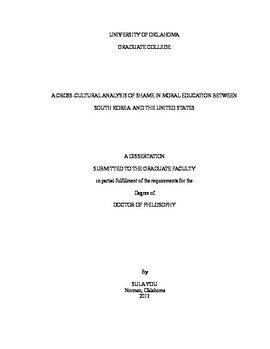| dc.description.abstract | Although there have been various issues involving shame in the educational scene, little research in the field of philosophy of education has seriously investigated this topic. In my dissertation, a comparative philosophical study is conducted in an attempt to develop a better understanding of shame in moral education. This study explores when shame is morally appropriate and how shame is relevant to moral education, either positively or negatively, through historical and multidisciplinary reviews on the concept of shame and cross-cultural analysis of shame-related matters within the context of moral education between South Korea and the United States.
In the process of finding sources discussing shame and related issues, a variety of scholarly works in the humanities and social sciences, from classical to contemporary, are surveyed in early chapters of this dissertation. Accordingly, diversified concepts of shame and its complex nature concerning moral education are identified. The later chapters illustrate how shame is associated with education practices, pedagogical approaches, and curriculum by providing selected examples, not only observed by other researchers but also obtained from my own case studies—utilizing content analysis of Korean textbooks and semi-structured interviews with education practitioners in an urban area in central Oklahoma.
As a result, this study shows that the moral value of shame is explicitly taught in the Korean education system and negative shame-related phenomena such as shaming are tightly guarded against in the American education setting. This leads to two different consequences: the misuse of shame is underestimated in South Korea, while the moral potential of shame is undervalued in the United States. Ultimately, the study prescribes the re-contextualization of shame in company with the promotion of intercultural awareness, which are both urgently needed for a well-balanced, high quality moral education in today’s multicultural and globalized age.
Keywords: sense of shame, shame in moral education, moral pedagogy | en_US |
